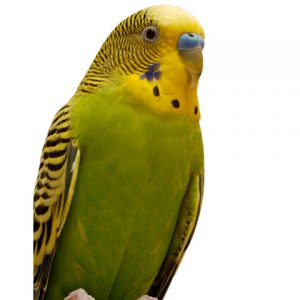Contents
 Budgies (parakeets) chatter a lot, as budgie owners will have noticed. What does all that chatter mean? Hopefully, it means for the most part that your budgies are content and carrying on some flock talk. Here are some common budgie sounds and what they might mean.
Budgies (parakeets) chatter a lot, as budgie owners will have noticed. What does all that chatter mean? Hopefully, it means for the most part that your budgies are content and carrying on some flock talk. Here are some common budgie sounds and what they might mean.
“I’m Mad!”
Along with chatter, budgies squabble about territory, mates, nest boxes and sharing their food or water. A budgie that is a little angry or territorial might make a sound that is kind of like tssssk. Sometimes it will show up in the middle of otherwise happy chatter. Maybe your budgies are just recalling an angry moment? If it is accompanied by an open beak, raised wings or biting at another budgie’s feet, then the budgie is telling off another budgie. Luckily, these squabbles are generally short-lived, and someone usually backs down. There is likely to be more of this in the spring and fall when the natural daylight signals a rise in hormone levels for our budgie pals.
Singing
A budgie in a really good mood might sing. He emits high-pitched garbled but melodic singing with high and low notes. This differs from plain, monosyllabic and monotone chatter.
Beak Grinding
A really content budgie that feels safe might grind his beak as he goes to sleep. It sounds like what it is, a slightly disturbing sound that might make it harder for you to get to sleep when it is happening!
Chirps
Sometimes a budgie will make a single note, a chirp. Several budgies might synchronize and chirp together. Did I say I’d let you know what vocalizations mean? I can’t peg this one, but you should know that it happens. It gives a group of budgies something to do, sing together. And it’s a happy sound for both you and your budgies.
Clicks
Occasionally, along with chatter and chirps, budgies will make clicking sounds. This is another happy sound.
Chattering
Once more, this is the prevalent budgie noise. It’s a constant chatter, interspersed with chirps and clicks, and if you have several budgies they most likely will all be doing it. They’ll throw in a few tssks as they get in each other’s way, but, overall, this is happy noise.
Contact Call
If your budgie misses you or hears another budgie within earshot, he might let loose a contact call, a long, drawn out, insistent single call. It kind of sounds like a person whistling. Tweeeeeet! It’s one call. If you hear this and answer consistently with a contact call of your own, it will reassure your budgie.
Trills
Sometimes budgies trill; that is, emit a long drawn out chip, with a couple notes thrown in. It’s not as complex as a song, but it is more melodic than plain chatter.
Distress/Danger Call
The distress call, as with any companion bird, is unmistakable. It’s a scream. Check on your budgie, and help him calm down or seek medical attention if he appears hurt. Your budgie may have merely seen a cat or hawk outside passing by the window; or he might be bothered by an overhead fan or clock. Or there could be real danger; did the neighborhood kitty come in? When you hear your budgie’s distress call, never assume that he is over-reacting to something — always check on him to make sure everything is OK.
Sounds
Budgies can mimic sounds. It might not be an exactly true imitation, but listen closely if your budgie is making unusual noises. Is that the doorbell, the microwave’s ding, water gurgling down a drain, a squirt bottle noise, or a creaking door? Male budgies are most likely to produce these types of sounds. They may appear in aimless chatter, or there could be times that your action triggers a particular sound. If you open the door, your budgie may “close” it; if you pick up the phone and say, “Hello,” your budgie may start holding your end of a conversation.
Talking
Some of that chirping a budgie does is not aimless. Budgies are great talkers. Well, the males are. A female cannot be expected to talk or mimic sounds, but male budgies can actually learn an incredible number of words. Budgies talk in a high-pitched chirp and at a fast pace. Listen to gargling or gurgling sounds your budgie makes, and see if you can hear words in it. The words are most likely to be ones you repeat often, and they can also be words or phrases your budgie picked up from radio or TV.
A budgie named Puck, who lived a relatively short life (5 years) in Petaluma, Calif., was named the most talking bird in the 1995 edition of the Guinness Book of Records, as well as in several subsequent editions. Puck said more than 1,700 words. His words were verified by numerous area experts, including members of the local bird club. Puck’s owner recorded his chatter and slowed it down to hear some of the words. Then she carefully recorded each one. Puck repeated what he heard, but also made up rhymes and poems and alliteration. Don’t underestimate the intelligence of your small budgie, and do listen carefully to that chatter.
When Do Budgies Vocalize?
Budgies will chirp when they like music you are playing, and you may find that they have a favorite song, so try out several songs and genres of music for your budgie pets. They’ll chirp when they are happy. If there is noise in a room, if you’re playing the radio or TV, your birds will keep up with the ambient noise. So, the noisier an environment, the more noise your birds will make.





